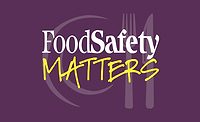Ep. 141. Mukherjee and Fattori: Preparing for Tomorrow's Food Safety Risks, Today

Keya Mukherjee, Ph.D., is a Food Safety Specialist with the Food Systems and Food Safety Division of the Food and Agriculture Organization of the United Nations (FAO). Dr. Mukherjee coordinates the division's work on food safety foresight, where she uses "futures thinking" to identify and evaluate new trends and drivers with varying impacts on the global food safety landscape. She has authored a number of publications on key emerging areas in food safety. She is also part of the FAO Secretariat of the Joint FAO/WHO Expert Committee on Food Additives (JECFA), a body that provides independent scientific advice on various food additives, veterinary drugs, and contaminants to different Codex Alimentarius committees and FAO member countries. Dr. Mukherjee holds a Ph.D. in Biochemistry from Texas A&M University, an M.S. degree in Biotechnology from the University of Essex, and a B.S. degree in Life Sciences from Ramnarain Ruia College.
Vittorio Fattori, Ph.D., is a Food Safety Officer in the Food Systems and Food Safety Division of FAO, where he both coordinates the foresight program on emerging food safety issues and provides scientific advice. Some of his focus areas include evaluating how new trends and drivers of change can affect food safety to proactively respond to risks, as well as optimize opportunities; working in the Secretariat of the Joint FAO/WHO Expert Committee on Food Additives (JECFA) to provide scientific advice to Codex Alimentarius, FAO members, and other UN agencies on food additives, contaminants, and residues of veterinary drugs in food; and providing technical guidance on food safety regulatory and emerging issues. Before joining FAO, Dr. Fattori worked in research laboratories in academia and the private sector in the UK, Japan, and the U.S. His research activities have focused on the assessment of food safety risks posed by contaminants and pesticides. He also spent time in Africa, where his work in a rural community has further impressed upon him the need for guidance and support concerning food safety and public health.
In this episode of Food Safety Matters, we speak with Dr. Mukherjee and Dr. Fattori [31:03] about:
- Food safety hazards that are unique to novel foods like insect protein and cell-based meats, as well as hazards that these novel foods have in common with traditional foods
- How edible seaweed producers can mitigate heavy metals and microplastics contamination as the commodity rises in popularity globally, as well as existing knowledge and regulatory gaps for the food type
- The wide variety of ways in which climate change is affecting food safety, and steps that must be taken to better safeguard food supplies against its effects
- The food safety consequences of warming oceans and increasingly scarce access to clean water
- How changes in temperature, precipitation, and other factors are affecting the geographic distribution and persistence of foodborne pathogens, such as Salmonella and Campylobacter
- How food growers and processors can respond to the growing threat of mycotoxigenic fungi and toxin-producing algae
- Food safety concerns associated with controlled environment agriculture, which are integral to urban farming
- The importance of establishing a circular plastics economy, and how to ensure food safety in the development and use of recycled food contact materials and alternatives to plastic packaging.
News and Resources:
News Coverage and Related Resources
EPA to Regulate Certain PFAS as Contaminants, Set Limits in Drinking Water [6:26]
“The Growing Challenge of Safe Water for use in Food Processing Operations” by Larry Keener
“EPA Proposes Enforceable Limits for PFAS in Drinking Water” by Consumer Reports
FDA Asks Infant Formula Industry to Double-Check Food Safety Controls [16:23]
Theme of World Food Safety Day 2023: “Food Standards Save Lives” [26:07]
Food Safety Magazine Articles
June/July '22: "New Food Sources and Food Production Systems: Exploring the Food Safety Angle"
June/July '21: "How Is Climate Change Affecting the Safety of Our Food?"
FAO Web Resources
Thinking about the Future of Food Safety: A Foresight Report
Climate Change: Unpacking the Burden on Food Safety
Safety and Quality of Water Used with Fresh Fruits and Vegetables
FAO Videos
What New Foods are on the Horizon?
Ensuring the Food Safety of Cell-Based Food
Climate Change is Threatening the Safety of Our Food
Food Safety Summit 2023
Register for the 2023 Food Safety Summit with discount code FSM23Podcast for 10% off!
We Want to Hear from You!
Please send us your questions and suggestions to podcast@food-safety.com
Looking for a reprint of this article?
From high-res PDFs to custom plaques, order your copy today!





